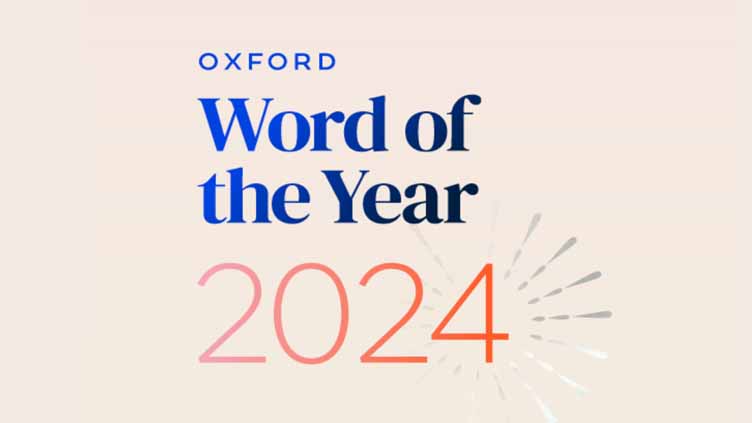Time to shed the rot and activate the brain

World
The OUP, on the basis of public vote, announces Oxford Word of the Year for 2024
OXFORD (Web Desk) – The Oxford University Press (OUP) has announced ‘brain rot’ as its ‘Word of the Year’ for 2024.
In keeping with its tradition, the prestigious institution recently conducted a public vote online in which more than 37,000 people had their say.
The OUP, on the basis of the vote, announced Oxford Word of the Year for 2024 is ‘brain rot’.
“Our language experts created a shortlist of six words to reflect the moods and conversations that have helped shape the past year. After two weeks of public voting and widespread conversation, our experts came together to consider the public’s input, voting results, and our language data, before declaring ‘brain rot’ as the definitive Word of the Year for 2024,” says the announcement on website.
A WORD ABOUT BRAIN ROT
Brain rot is defined as “the supposed deterioration of a person’s mental or intellectual state, especially viewed as the result of overconsumption of material (now particularly online content) considered to be trivial or unchallenging.
“Also: something characterized as likely to lead to such deterioration”.
According to information shared on web, the OUP says: “Our experts noticed that ‘brain rot’ gained new prominence this year as a term used to capture concerns about the impact of consuming excessive amounts of low-quality online content, especially on social media. The term increased in usage frequency by 230% between 2023 and 2024.
“The first recorded use of ‘brain rot’ was found in 1854 in Henry David Thoreau’s book Walden, which reports his experiences of living a simple lifestyle in the natural world. As part of his conclusions, Thoreau criticizes society’s tendency to devalue complex ideas, or those that can be interpreted in multiple ways, in favour of simple ones, and sees this as indicative of a general decline in mental and intellectual effort:
“While England endeavours to cure the potato rot, will not any endeavour to cure the brain-rot – which prevails so much more widely and fatally?”
Also Read: Vote for Oxford 'Word of the Year' on
“The term has taken on new significance in the digital age, especially over the past 12 months. Initially gaining traction on social media platform - particularly on TikTok among Gen Z and Gen Alpha communities - ‘brain rot’ is now seeing more widespread use, such as in mainstream journalism, amidst societal concerns about the negative impact of overconsuming online content.
“In 2024, ‘brain rot’ is used to describe both the cause and effect of this, referring to low-quality, low-value content found on social media and the internet, as well as the subsequent negative impact that consuming this type of content is perceived to have on an individual or society.”
EXPERT OPINION
Speaking about this year’s selection process and the 2024 winner, Casper Grathwohl, President of Oxford Languages, said:
“It’s been insightful and deeply moving to see language lovers all over the world participate and help us select the Oxford Word of the Year 2024.
“Looking back at the Oxford Word of the Year over the past two decades, you can see society’s growing preoccupation with how our virtual lives are evolving, the way internet culture is permeating so much of who we are and what we talk about.
Last year’s winning word, ‘rizz’, was an interesting example of how language is increasingly formed, shaped, and shared within online communities. ‘Brain rot’ speaks to one of the perceived dangers of virtual life, and how we are using our free time. It feels like a rightful next chapter in the cultural conversation about humanity and technology. It’s not surprising that so many voters embraced the term, endorsing it as our choice this year.
“I find it fascinating that the term ‘brain rot’ has been adopted by Gen Z and Gen Alpha, those communities largely responsible for the use and creation of the digital content the term refers to. These communities have amplified the expression through social media channels, the very place said to cause ‘brain rot’.
It demonstrates a somewhat cheeky self-awareness in the younger generations about the harmful impact of social media that they’ve inherited.”
COMPETING WORDS
Earlier, six words were chosen while keeping in view latest trends and conversations.
Let’s have a look at the list of competing words and their meanings.
Lore (n.): A body of (supposed) facts, background information, and anecdotes relating to someone or something, regarded as knowledge required for full understanding or informed discussion of the subject in question.
Read More: Are you word lover? OUP has one for you
Brain rot (n.): Supposed deterioration of a person’s mental or intellectual state, especially viewed as the result of overconsumption of material (now particularly online content) considered to be trivial or unchallenging.
Dynamic pricing (n.): The practice of varying the price for a product or service to reflect changing market conditions; in particular, the charging of a higher price at a time of greater demand.
Demure (adj.): Of a person: reserved or restrained in appearance or behaviour. Of clothing: not showy, ostentatious, or overly revealing.
Slop (n.): Art, writing, or other content generated using artificial intelligence, shared and distributed online in an indiscriminate or intrusive way, and characterised as being of low quality, inauthentic, or inaccurate.
Romantasy (n.): A genre of fiction combining elements of romantic fiction and fantasy, typically featuring themes of magic, the supernatural, or adventure alongside a central romantic storyline.
Last year the public chose ‘rizz’ and 'goblin mode' in 2022.


